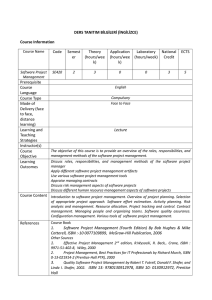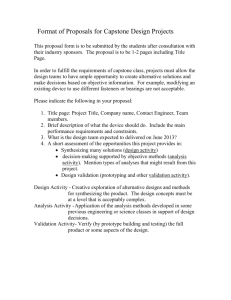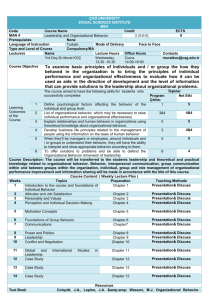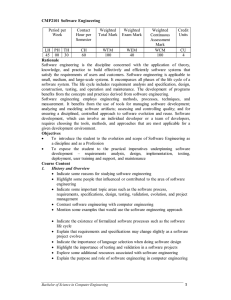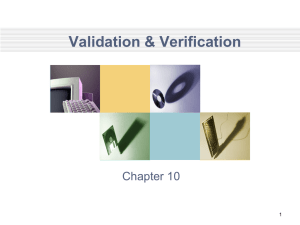Course File - Software Engineering department
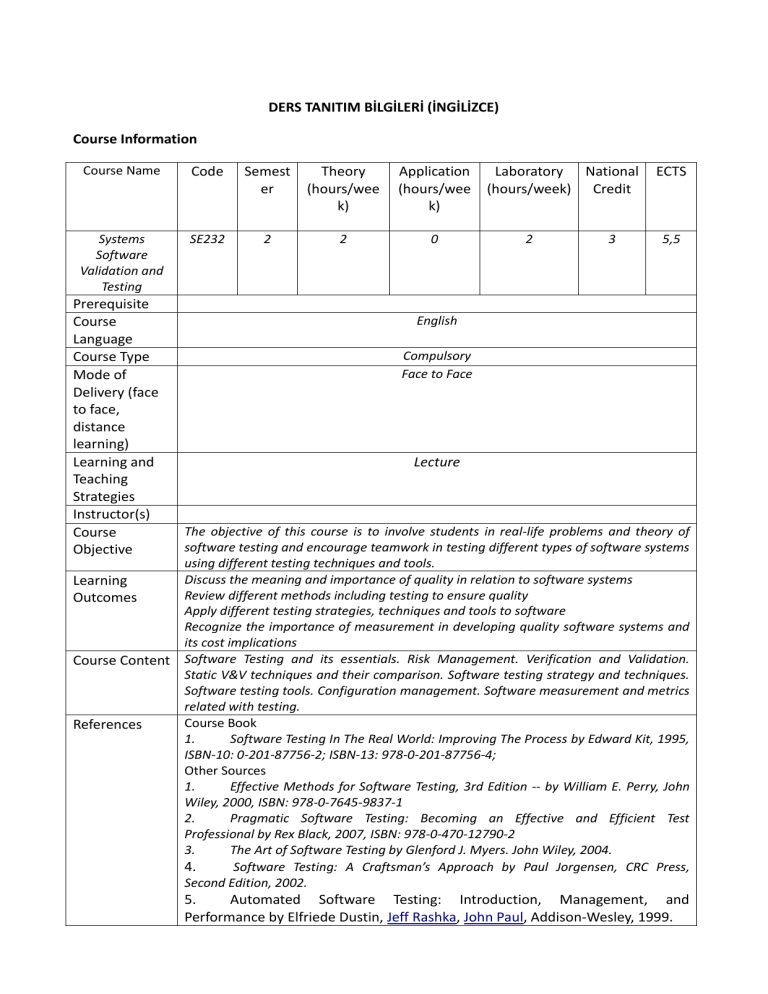
DERS TANITIM BİLGİLERİ (İNGİLİZCE)
Course Information
Course Name Code Semest er
Theory
(hours/wee k)
Application
(hours/wee k)
0
Laboratory
(hours/week)
National
Credit
ECTS
Systems
Software
Validation and
Testing
Prerequisite
Course
Language
Course Type
SE232 2 2
English
Compulsory
2 3 5,5
Mode of
Delivery (face to face, distance learning)
Learning and
Teaching
Strategies
Face to Face
Lecture
Instructor(s)
Course
Objective
Learning
Outcomes
The objective of this course is to involve students in real-life problems and theory of software testing and encourage teamwork in testing different types of software systems using different testing techniques and tools.
Discuss the meaning and importance of quality in relation to software systems
Review different methods including testing to ensure quality
Apply different testing strategies, techniques and tools to software
Recognize the importance of measurement in developing quality software systems and its cost implications
Course Content Software Testing and its essentials. Risk Management. Verification and Validation.
Static V&V techniques and their comparison. Software testing strategy and techniques.
Software testing tools. Configuration management. Software measurement and metrics related with testing.
References Course Book
1.
Software Testing In The Real World: Improving The Process by Edward Kit, 1995,
ISBN-10: 0-201-87756-2; ISBN-13: 978-0-201-87756-4;
Other Sources
1.
Effective Methods for Software Testing, 3rd Edition -- by William E. Perry, John
Wiley, 2000, ISBN: 978-0-7645-9837-1
2.
Pragmatic Software Testing: Becoming an Effective and Efficient Test
Professional by Rex Black, 2007, ISBN: 978-0-470-12790-2
3.
The Art of Software Testing by Glenford J. Myers. John Wiley, 2004.
4.
Software Testing: A Craftsman’s Approach by Paul Jorgensen, CRC Press,
Second Edition, 2002.
5.
Automated Software Testing: Introduction, Management, and
Performance by Elfriede Dustin, Jeff Rashka , John Paul , Addison-Wesley, 1999.
Weekly Course Outline
2. Week
3. Week
4. Week
5. Week
6. Week
7. Week
8. Week
9. Week
10. Week
11. Week
12. Week
13. Week
Weeks
1. Week
14. Week
15. Week
16. Week
Topics Pre-study
Software development life cycle models from
Testing Perspective
Lecture Notes
Software Testing, its significance & essentials Chapter 1 (main text), Lecture Notes
Risk Management & framework for Testing Chapter 5, Chapter 6
Verification & Validation Lecture Notes
Static V & V
Software testing strategies
Software testing techniques
Software testing techniques
Chapter 7
Chapter 8, Lecture Notes
Chapter 8, Lecture Notes
Chapter 8, Lecture Notes
Software testing techniques
Software testing techniques
Chapter 8, Lecture Notes
Chapter 8, Lecture Notes
Software testing tools Chapter 11, Lecture Notes
Maintenance and configuration management Lecture Notes
Chapter 12, Lecture Notes Software Measurement and Metrics related with Testing
Current practices, trends, challenges
Final Exam
Final Exam
Chapter 14
Assessment Methods
Course Activities
Attendance
Laboratory
Application
Field Activities
Specific Practical Training (if any)
Assignments
Presentation
Projects
Seminars
Midterms
Final Exam
Percentage of semester activities contributing grade success
Percentage of final exam contributing grade success
Total
Total
Workload and ECTS Calculation
Activities
Number
2
1
2
4
Number Duration
Percentage %
10
40
30
20
100
70
30
100
Total Work Load
(Hours)
Course Duration (x14)
Laboratory
Application
Specific practical training (if any)
Field Activities
Study Hours Out of Class (Preliminary work, reinforcement, etc.)
Presentation / Seminar Preparation
Projects
Homework assignment
Midterms ( Study duration )
Final ( Study duration )
Total Workload
16
1
16
3
2
1
3
5
4
5
10
15
Matrix of the Course Learning Outcomes Versus Program Outcomes
Program Outcomes
48
5
64
15
20
15
167
Contribution Level*
1 2 3 4 5
1 An ability to apply knowledge of computing, sciences and mathematics to solve software engineering problems.
2 An ability to analyze and model a domain specific problem, identify and define the appropriate software requirements for its solution.
3 An ability to design, implement and evaluate a software system, component, process or program to meet specified requirements.
4 An ability to use the modern techniques and engineering tools necessary for software engineering practices.
5 An ability to gather/acquire, analyze and interpret data to understand software requirements.
6 The ability to demonstrate the necessary organizational and business skills to work effectively in inter/inner disciplinary teams or individually.
7 An ability to communicate effectively in Turkish and English.
8 Recognition of the need for, and the ability to access information, to follow recent developments in science and technology and to engage in life-long learning.
9 An understanding of professional, legal, ethical and social issues and responsibilities.
10 Skills in project and risk management, awareness about importance of entrepreneurship, innovation and long-term development, and recognition of international standards and methodologies.
11 An understanding about the impact of software engineering solutions in a global societal and legal context.
12 An ability to apply algorithmic principles, mathematical
X
X
X
X
X
foundations, and computer science theory in the modeling and design of computer-based systems with the tradeoffs involved in design choices.
13 The ability to apply engineering approach to the development of software systems by analyzing, designing, implementing, verifying, validating and maintaining software systems.
1: Lowest, 2: Low, 3: Average, 4: High, 5: Highest
X
